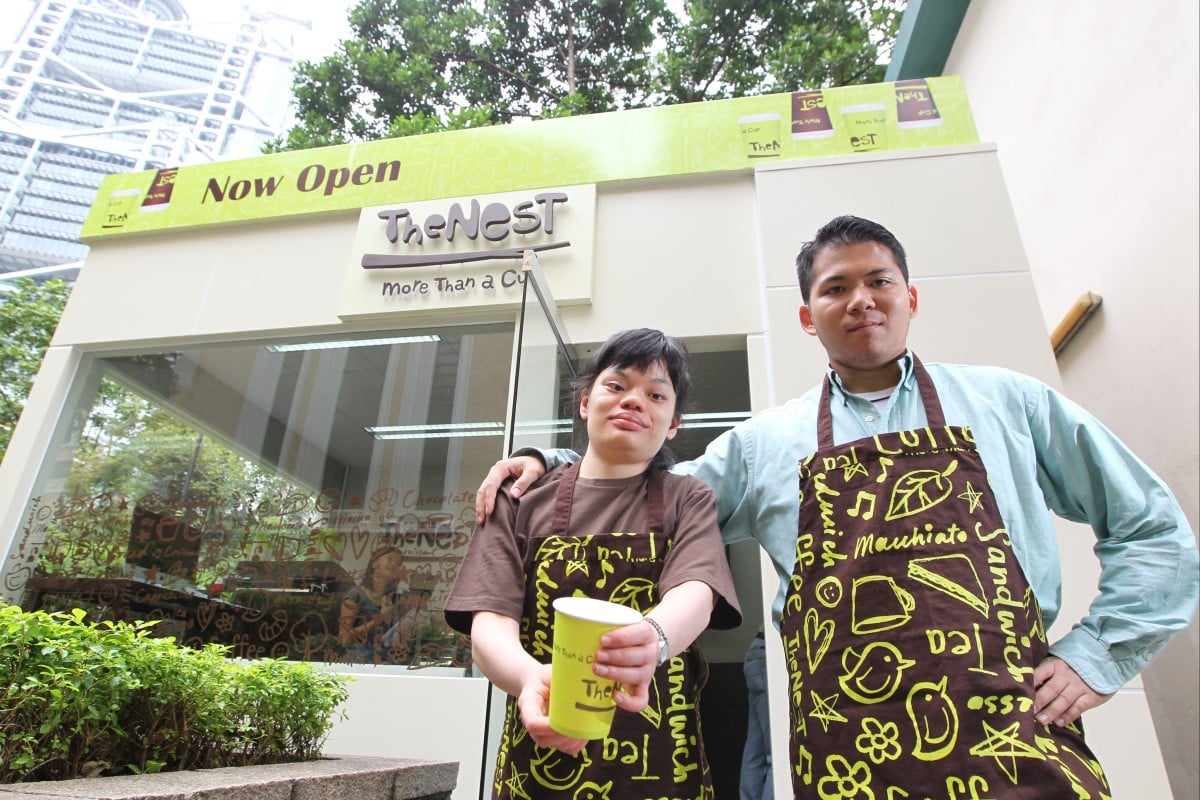
Your Voice: How Hong Kong neglects its disabled community; why city’s youth are so exhausted (long letters)
- One reader voices concern about the city’s ableism – discrimination against people with disabilities – and suggests what society should do about it
- Another student explains why starting the school day at a later time is not enough to help Hong Kong’s fatigued students
 The Nest cafe is a coffee shop that helps people with learning disabilities transition to professional work, an opportunity that is scarce for disabled people in Hong Kong. Photo: SCMP
The Nest cafe is a coffee shop that helps people with learning disabilities transition to professional work, an opportunity that is scarce for disabled people in Hong Kong. Photo: SCMPHave something to say? Send us a letter using this Google form.
Hong Kong is neglecting its disabled community
James Ellis, Hong Kong International School
People are becoming increasingly aware of the various forms of discrimination pervasive in modern society. One of these is ableism – discrimination and prejudice against people with disabilities. In Hong Kong, ableism is a particularly concerning issue.
I have had the privilege of working at the Nesbitt Centre, a social service organisation in Hong Kong that empowers disabled individuals to live independently and advocate for themselves.
Volunteering here has been an eye-opening experience, and I have noted our city’s negligence towards the disabled community.
The problems people with hearing disabilities face during Covid-19
There is a considerable scarcity of government programmes that support disabled people. Rehabilitation, vocational and transport services primarily serve the physically disabled, and the government falls short in expanding its services to aid the mentally challenged.
Along with this shortage of government initiatives, companies rarely make adjustments to incorporate disabled employees into the workplace. Complete integration into society involves getting a suitable job, but many employers are simply uninterested in offering a chance to disabled applicants.
Ableism has consequences for everyone in society. Disabled workers are as valuable as able-bodied employees, and including them can create a more tolerant work environment and transform people’s negative perceptions of disability.
Students with disabilities doubly impacted by half-day lessons
The Nesbitt Centre has opened three coffee shops to help those with learning disabilities transition to professional work, but this is only the first step. Without changing the public’s attitude, Hong Kong will continue to be an unwelcoming place for people with disabilities.
One of the biggest issues that disabled Hongkongers face is day-to-day bigotry. Many able-bodied people are not sympathetic towards disabled people’s needs. Thus, there is a lack of understanding when it comes to physical impairments and learning challenges. Some people will even attack and bully disabled people.
In a city like Hong Kong, where personal achievement and success is often prioritised, the disabled community may seem insignificant or – even worse – an easy target.
But in such a highly-developed city, disability should not be a barrier.
Taking action now could begin to amend the city’s past failures in supporting its disabled residents.
On the largest scale, the government must enact legislation to support them. This entails improving access to affordable housing, employment opportunities, social support and financial security for disabled residents.
If Hong Kong is truly proud of its Paralympians, it needs to be better
Employment and social exclusion are two of the most significant hurdles for this population in Hong Kong. Thus, it is imperative that businesses hire employees with disabilities and create working environments that suit their needs.
Lastly, getting rid of intolerance is vital. This begins with educating our youth.
Schools should conduct workshops that denounce discrimination and promote compassion for people with physical and mental disabilities. They can also inform students about the harm that derogatory terms and insensitive comments can cause while teaching pupils how to support disabled people in their communities.
An issue as big as ableism requires just as big an effort to combat.
Zero to Hero tells the story of one of Hong Kong’s most famous Paralympians
Why are Hong Kong’s students so fatigued?
Serene Chan Hei-tung, Fukien Secondary School
Hong Kong is well-known for its competitive education system and a lack of balance between work and play for students. This is wearing down the young people of this city. As the youth are the future pillars of society, this crisis cannot be ignored.
Scientists recommend that people should sleep for at least eight hours every day. However, most Hong Kong students cannot meet this standard. There are countless reasons for this – be it the ceaseless homework from teachers or the countless exercises from tutorial classes.
If they were to follow the recommended sleeping time, students would not be able to finish their work every night. Thus, they stay up late to study and feel tired the next morning. But this fatigue can impair their ability to focus and learn in class.
How to do a mental health check up
Some people believe that the early start time for schools is the reason students are so exhausted. Thus, they think that setting a later start time would help pupils get more rest and, in the long run, benefit their mental health.
The crux of the problem, however, lies not with how late the school day should start, but in the problematic expectations for success.
How will postponing school start times by an hour relieve students’ stress? How is it different from encouraging students to sleep an hour later since they can arrive at school later?
The heavy workload remains unchanged and will still require the same amount of time to finish. The root of this issue is the high-stress education system. If this problem is not addressed, any other measures are deceptive, empty promises.
The burdensome academic workload and stressful learning environment make students tired. Of course, if we ignore this, their tiredness will persist.
As students continue to be encouraged and pushed to sacrifice sleep for their academic pursuits, their deteriorating psychological health must not be overlooked. Mental health issues are one of the biggest challenges facing Hong Kong youth today.
Extensive education reforms are required to rescue students from this grave situation. In the meantime, I sincerely hope that my peers can find ways to get more rest and relieve their stress. Perhaps we can one day study and live energetically and blissfully.
